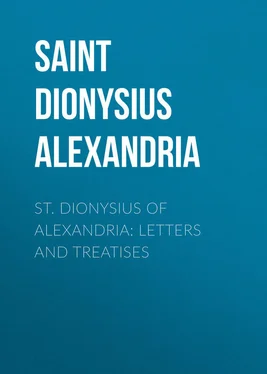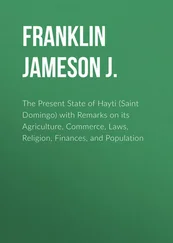Saint Dionysius of Alexandria - St. Dionysius of Alexandria - Letters and Treatises
Здесь есть возможность читать онлайн «Saint Dionysius of Alexandria - St. Dionysius of Alexandria - Letters and Treatises» — ознакомительный отрывок электронной книги совершенно бесплатно, а после прочтения отрывка купить полную версию. В некоторых случаях можно слушать аудио, скачать через торрент в формате fb2 и присутствует краткое содержание. Жанр: foreign_religion, foreign_antique, foreign_prose, на английском языке. Описание произведения, (предисловие) а так же отзывы посетителей доступны на портале библиотеки ЛибКат.
- Название:St. Dionysius of Alexandria: Letters and Treatises
- Автор:
- Жанр:
- Год:неизвестен
- ISBN:нет данных
- Рейтинг книги:5 / 5. Голосов: 1
-
Избранное:Добавить в избранное
- Отзывы:
-
Ваша оценка:
- 100
- 1
- 2
- 3
- 4
- 5
St. Dionysius of Alexandria: Letters and Treatises: краткое содержание, описание и аннотация
Предлагаем к чтению аннотацию, описание, краткое содержание или предисловие (зависит от того, что написал сам автор книги «St. Dionysius of Alexandria: Letters and Treatises»). Если вы не нашли необходимую информацию о книге — напишите в комментариях, мы постараемся отыскать её.
St. Dionysius of Alexandria: Letters and Treatises — читать онлайн ознакомительный отрывок
Ниже представлен текст книги, разбитый по страницам. Система сохранения места последней прочитанной страницы, позволяет с удобством читать онлайн бесплатно книгу «St. Dionysius of Alexandria: Letters and Treatises», без необходимости каждый раз заново искать на чём Вы остановились. Поставьте закладку, и сможете в любой момент перейти на страницу, на которой закончили чтение.
Интервал:
Закладка:
Saint of Alexandria Dionysius
St. Dionysius of Alexandria: Letters and Treatises
PREFACE
Not long after my edition of this Father’s writings appeared in the Cambridge Patristic Texts (1904), I was invited to translate the Letters and some of the other more certainly genuine fragments that remain into English for the present series; but it is not until now that I have been able to accomplish the task I then undertook. Since then, though chiefly occupied in other researches, I have naturally acquired a more extensive and accurate knowledge of St. Dionysius and his times, some of the results of which will be found in this volume. Nevertheless, I was bound to incorporate a considerable amount of the information and conclusions arrived at in the former work, and wish to express my acknowledgments to the Syndics of the University Press for leave to do so, as well as to those again whose names I mentioned as having assisted me before.
In the present book Dr. A. J. Mason was kind enough to advise me over the choice of extracts from the two treatises, On Nature and Refutation and Defence , and on one or two minor points, while a friend and neighbour (the Rev. L. Patterson) read through the whole of the MS. before it went to the printer and gave me the benefit of a fresh mind upon a number of small details of style and fact, for which I sincerely thank him.
C. L. Feltoe.Ripple by Dover
March 1918.
INTRODUCTION
1. None of the many influential occupants of the see of Alexandria and of the many distinguished heads of the Catechetical School in that city seem to have been held in higher respect by the ancients than Dionysius. By common consent he is styled “the Great,” while Athanasius, one of his most famous-successors as Bishop, calls him “Teacher of the Church universal,” and Basil (of Cæsarea) refers to him as “a person of canonical authority” (κανονικός). He took a prominent and important part in all the leading movements and controversies of the day, and his opinions always carried great weight, especially in Eastern Christendom. His writings are freely referred to and quoted, not only by Eusebius the historian, 1 1 In one of Eusebius’s works (the Præparatio Evangelica ) he is quoted side by side with great authors like Plato and Aristotle.
but also by Athanasius, Basil and John of Damascus amongst others. And what we gather of his personal story from his letters and various fragments embodied in the works of others – and very little, if anything else, for certain has come down to us – undoubtedly leaves the impression that the verdict of the ancient world is correct.
His Family and Earlier Life
2. The references to his family and early years are extremely scanty and vague. In the Chronicon Orientale , p. 94, he is stated to have been a Sabaita and sprung from “the chiefs and nobles of that race”: and several writers speak as if he had been a rhetorician before his conversion (as Cyprian of Carthage had been). The exact meaning of the term “Sabaita” above is doubtful. Strictly used, it should mean a member of the Sabaite convent near Jerusalem, and the Chronicon may be claiming Dionysius as that, though, of course, without any ground for the claim. If it is equivalent, however, to “Sabæan” here, it implies an Arab descent for him, which is hardly probable, as he seems always to consider himself connected by education and residence, if not by birth, with the city-folk of Alexandria, whom he distinguishes from the Coptic inhabitants of Egypt (Αἰγύπτιοι); so that it would be rather surprising to find that his family came from the remoter parts of Arabia, where the Sabæans dwelt. The other tradition of his having been a rhetorician may be due to some confusion between our Dionysius and a much later Alexandrian writer of the same name, who edited the works of the Areopagite with notes and wrote other treatises. On the other hand, Dionysius’s literary style is such that it might very well have been formed by the study and practice of rhetoric, while he has been thought himself to corroborate the statement of the Chronicon Orientale , as to the high position of his family, in his reply to Germanus ( p. 49 Конец ознакомительного фрагмента. Текст предоставлен ООО «ЛитРес». Прочитайте эту книгу целиком, купив полную легальную версию на ЛитРес. Безопасно оплатить книгу можно банковской картой Visa, MasterCard, Maestro, со счета мобильного телефона, с платежного терминала, в салоне МТС или Связной, через PayPal, WebMoney, Яндекс.Деньги, QIWI Кошелек, бонусными картами или другим удобным Вам способом.
), where he refers to the “losses of dignities” which he has suffered for the Faith.
3. He was probably a priest, and not less than thirty, when he became head of the Catechetical School in 231, and in 264 he excused himself from attendance at the Council of Antioch on the ground of age and infirmity; and so it is a safe inference that he was born about or before 200, being thus nearly of an age with Cyprian of Carthage, and only ten or fifteen years younger than Origen, his master.
His Conversion
4. The Chronicon Orientale assigns the reading of St. Paul’s letters as the cause of his conversion to Christianity, and proceeds to state how, after their perusal, he presented himself for baptism to Demetrius, then Bishop of Alexandria, who admitted him in due course. Whether this was actually the cause of his conversion or not, we know from what he has himself told us in his letter to Philemon ( p. 56 Конец ознакомительного фрагмента. Текст предоставлен ООО «ЛитРес». Прочитайте эту книгу целиком, купив полную легальную версию на ЛитРес. Безопасно оплатить книгу можно банковской картой Visa, MasterCard, Maestro, со счета мобильного телефона, с платежного терминала, в салоне МТС или Связной, через PayPal, WebMoney, Яндекс.Деньги, QIWI Кошелек, бонусными картами или другим удобным Вам способом.
), that both before and after baptism he was a diligent student of all that was written for and against Christianity.
Was He Married or Not?
5. Whether, in accordance with the common practice of the Eastern Church at that time, Dionysius was married or not, is a moot point. He addressed his treatise περὶ Φύσεως to one Timotheus ὁ παῖς, and we read of ὁι παῖδες (of whom Timotheus was one) as accompanying him in his flight ( p. 44 Конец ознакомительного фрагмента. Текст предоставлен ООО «ЛитРес». Прочитайте эту книгу целиком, купив полную легальную версию на ЛитРес. Безопасно оплатить книгу можно банковской картой Visa, MasterCard, Maestro, со счета мобильного телефона, с платежного терминала, в салоне МТС или Связной, через PayPal, WebMoney, Яндекс.Деньги, QIWI Кошелек, бонусными картами или другим удобным Вам способом.
). One would naturally infer from this that he was then a widower (his wife not being mentioned), and that these were his sons; but they may have been his pupils, on the supposition that he was still Catechete as well as Bishop, or, which is less likely, his servants. 2 2 Most of those who read this will be aware that παῖς (Lat. puer ) can be used in various senses, like our “boy” and French garçon .
Интервал:
Закладка:
Похожие книги на «St. Dionysius of Alexandria: Letters and Treatises»
Представляем Вашему вниманию похожие книги на «St. Dionysius of Alexandria: Letters and Treatises» списком для выбора. Мы отобрали схожую по названию и смыслу литературу в надежде предоставить читателям больше вариантов отыскать новые, интересные, ещё непрочитанные произведения.
Обсуждение, отзывы о книге «St. Dionysius of Alexandria: Letters and Treatises» и просто собственные мнения читателей. Оставьте ваши комментарии, напишите, что Вы думаете о произведении, его смысле или главных героях. Укажите что конкретно понравилось, а что нет, и почему Вы так считаете.












